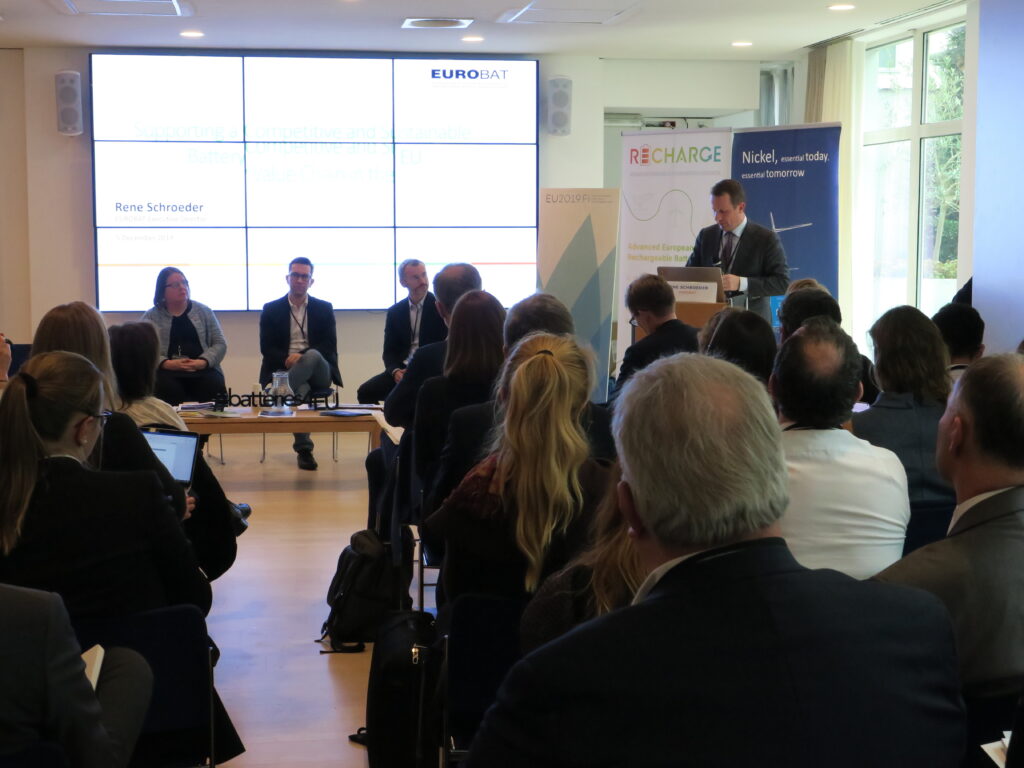EU battery value chain meets with policymakers and industry stakeholders to discuss the future of decarbonised mobility and energy generation infrastructures
On Thursday 5 December, 80 battery experts, policymakers and stakeholders met in Brussels in an event jointly organised by the Finnish Presidency of the Council, the Nickel Institute, EUROBAT and RECHARGE to discuss the next steps to further boost a responsible, competitive EU battery sector of the future. Participants took stock of the battery industry in Europe and of its strategic role for the completion of the EU industrial and environmental ambitions. They debated what further initiatives and developments are needed in view of decarbonisation and also analysed the necessary changes to the EU regulatory framework to ensure a sustainable, competitive and innovative battery ecosystem in the EU.
Through two key note speeches delivered by Joanna Szychowska, European Commission DG GROW and Sampsa Nissinen, Deputy Director General, Innovation and Enterprise Financing, Ministry of Economic Affairs and Employment of Finland, the event first addressed the role of the battery value chain and the relevance of the battery industry for the Finnish economy and European competitiveness. Ismail Ertug MEP provided an address on the regulatory environment for batteries and on the role that batteries can play in a European Green Deal. In the following two panel sessions, speakers representing the European Commission, the scientific community and the entire battery value chain elaborated on markets, investment and funding of research and then on the broader regulatory environment of the sector.
The event took place in the same week as the 2019 United Nations Climate Change (COP25) conference in Madrid, the last COP before 2020 when many countries are expected to put forward their new climate action plans. Sustainable batteries are a strategic sector for the European Union to reach its bold decarbonisation objectives while remaining globally competitive.
“Advanced battery technology is a strategic imperative for the industrial and social revolution towards a more empowered, sustainable and circular society. Without, the target of a climate-neutral economy by 2050 and the 2°C Paris Agreement goal cannot conceivably be reached”, said Claude Chanson, Managing Director at RECHARGE.
“The revision of the Batteries Directive and ELV Directive as well as the work on sustainability criteria are important milestones in the years ahead and we count on the EU institutions to find a balance between the broader EU policy ambitions and the needs of the European battery industry” said René Schroeder, Executive Director at EUROBAT.
Automotive and industrial batteries are directly linked to today’s key priorities, such as fighting climate change, sourcing responsible raw materials, generating renewable and low-carbon energy and developing an innovative and low-emission mobility infrastructure. In addition, batteries power everyday applications, such as smartphones, tablets, power tools, and robots and have become a significant job engine for millions of people around the world.
From lead and lithium to nickel, zinc and sodium, the contribution of all battery technologies will be necessary to meet the decarbonisation target.
“The production and recycling of strategic battery raw materials is essential to the development of a sustainable battery value chain in Europe. EU regulators and industry can do more together to boost Europe’s future battery value chains and guarantee that high environmental and sustainability standards are applied while safeguarding predictability for the required industry investments” said Veronique Steukers of the Nickel Institute.
To create a competitive battery manufacturing value chain in Europe and prevent technological dependence on non-EU competitors, the EU needs to continue to place batteries at the core of its industrial future.

Gert Meylemans, Director Communications, EUROBAT, GMeylemans@eurobat.org
Clare Richardson, Director Communications, Nickel Institute, crichardson@nickelinstitute.org
| Sampsa Nissinen, Deputy DG Finnish Ministry of Economic Affairs and Employment – MEP Ismail Ertug – Joanna Szychowska, Head of Unit, DG Grow, EU Commission |
EUROBAT is the association for the European manufacturers automotive, industrial and energy storage batteries. EUROBAT has more than 50 members from across the continent comprising more than 90% of the automotive and industrial battery industry in Europe. The members and staff work with all stakeholders, such as battery users, governmental organisations and media, to develop new battery solutions in areas of hybrid and electro-mobility as well as grid flexibility and renewable energy storage.
The Nickel Institute is the global association of leading primary nickel producers. Our mission is to promote and support the use of nickel in appropriate applications. The NI grows and supports markets for new and existing nickel applications including stainless steel, and promotes sound science, risk management, and socio-economic benefit as the basis for public policy and regulation. Through our science division NiPERA Inc., we also undertake leading-edge scientific research relevant to human health and the environment. The NI is the centre of excellence for information on nickel and nickel-containing materials and has offices in Asia, Europe and North America.
Founded in 1998, RECHARGE represents the multifold interests of the advanced rechargeable and lithium battery industry in Europe. Advanced rechargeable batteries are a key technology in an increasingly electrified world. They are a main enabler for the transition towards low-emission mobility and decarbonized energy generation, and power a vast number of everyday applications, such as smartphones, tablets, power tools and robots. Our unique membership covers all aspects of the advanced rechargeable batteries value chain, from suppliers of raw materials and battery manufacturers to OEMs, logistic partners and battery recyclers. To act on our mission of promoting advanced rechargeable batteries as a core technology that will contribute to the industrial and social revolution towards a more empowered, sustainable and circular Europe, we put all our efforts in improving battery acceptance while ensuring an international level playing field that provides continued market access for new and existing products.

